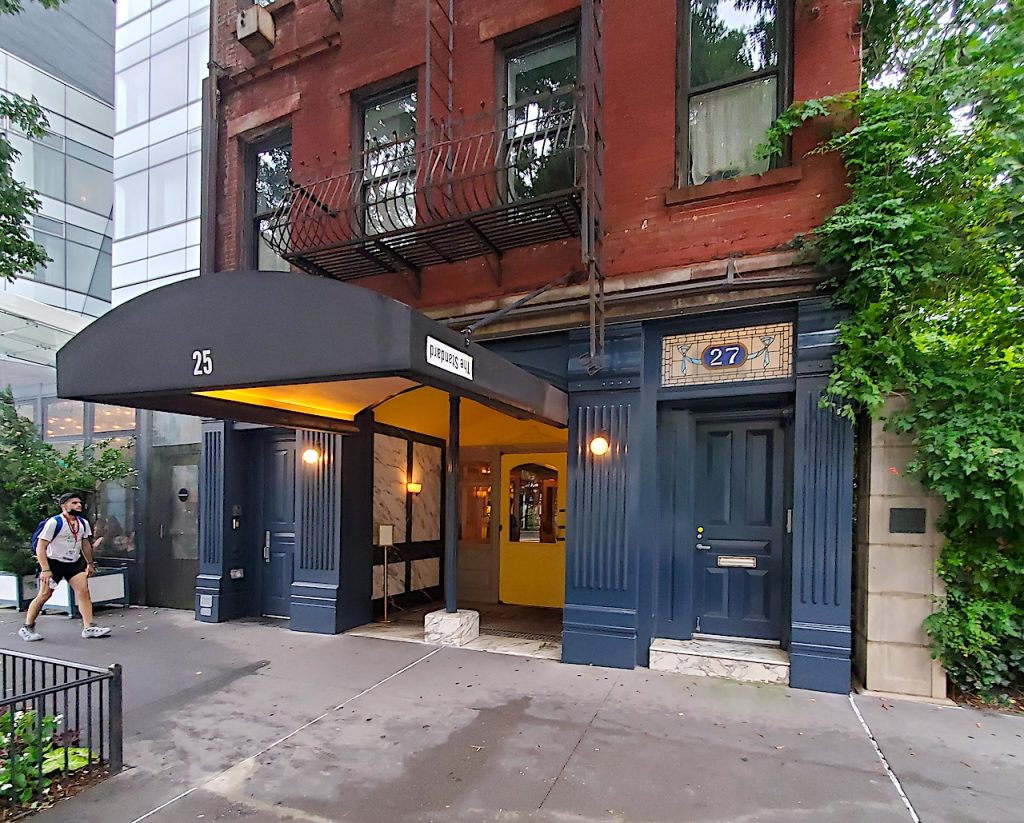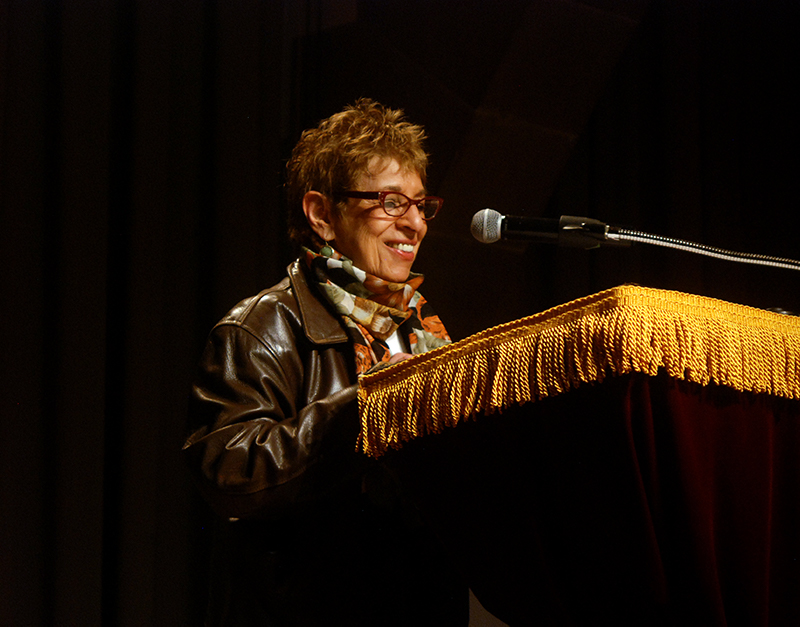BY LINCOLN ANDERSON | East Village poet Hettie Jones, who was a living connection to the creative ferment of the Beatnik era, died on Tues., Aug. 13. She was 90.
She had lived at 27 Cooper Square, between Fifth and Sixth Streets, since the early 1960s and the heyday of the Beats.
Jones died in Philadelphia, where she has family and was in hospital care.
Jones (née Cohen) was born in 1934 in Brooklyn and grew up in Queens in a middle-class family. She attended Mary Washington College in Virginia, where she unfortunately experienced anti-Semitism for the first time — though shrugged it off.
“Before I went away to college, I had never been in the home of a person who wasn’t Jewish,” she related in a March 2017 interview, “The Legend Upstairs,” with The Standard. “The roommates to whom I’d been assigned didn’t want to live with me because I was a Jew. That’s when I learned about white people, and I never identified with them because they didn’t identify with me.”
After graduating, she returned to New York and met and married writer LeRoi Jones, who would later be known as the Black power nationalist Amiri Baraka.
In an interview with Fox News in October 2018, Jones said marrying a Black man in the 1950s “made her an outcast of her Jewish family.”
“I never went back to my home again,” she said, explaining she was not welcome.
But she added, “His family embraced me. And that, of course, made everything possible.”
Together the couple founded a literary magazine, Yugen, and also the Totem Press, publishing works by legendary Beat writers, who went on to become their friends, including the likes of Allen Ginsberg, Jack Kerouac and Williams S. Burroughs, as well as Frank O’Hara, who was not a Beat but part of the New York School of poets.
As an interracial couple during that era, they sometimes faced social prejudice when they ventured out of the multicultural Lower East Side. She would bristle at the angry shouts and catcalls, but her husband, wanting to avoid conflict and stay safe, would keep cool.
As she told The Standard publication, “[W]e were walking along Bleecker Street one night. Little Italy was very bad at that time. Some boys were yelling at us. Nobody insulted me. I turn around and I’m ready to fight and he grabbed me and he said, ‘Just keep walking, just keep walking.’ … [T]hey would’ve beaten him up, not me. I realized, as a white person married to a black person, that the world is divided.”
They had two daughters, Kellie and Lisa. Despite the initial chill, Hettie’s parents would eventually visit her and her children.
Kellie Jones is a professor of art, archaeology and African American studies at Columbia, while Lisa Jones Brown is a writer and was a staffer at the Village Voice.
In 1964, the Downtown literary couple divorced after Baraka fathered a child with poet Diane DiPrima and moved to Harlem. Hettie Jones and the kids continued to live on Cooper Square.
Her poetry was known for focusing on everyday life and for its wit. She wrote 23 books during her life, including her memoir, “How I Became Hettie Jones,” in 1990. In 2005, she co-authored the memoir of Rita Marley, reggae great Bob Marley’s widow and one of the Wailers’ I-Three backing vocalists, “No Woman No Cry: My Life With Bob Marley.” That Jones had two Black daughters reportedly put Rita Marley at ease in terms of collaborating on the book project. Jones also penned children’s books, with an emphasis on including characters of color, after having found there to be a dearth of them.

Her friend Bob Holman of the Bowery Poetry Club said he visited Jones in a memory care facility in Philadelphia a few months before she passed. He said she was experiencing memory problems but was very physically fit.
Holman called Jones not just “a spark plug” of the Beat scene but “the living spirit of the neighborhood.”
“Hettie was not just a poet, writer, teacher, activist, mother and a primary figure in the Beat literary world,” he said. “She was also the person you were most likely to run into while walking or bicycling near her apartment on Cooper Square. She lived for over 50 years in the Little Brownstone That Could, the one she refused to leave. So The Standard Hotel built around her, and used her first floor for their lobby. Her autobiography, “How I Became Hettie Jones,” answered her husband LeRoi Jones/Amiri Baraka’s own autobiography by being the first book to tell, in crystal clear, engaging prose and great detail, the story of what it was like to be a woman and mother in the Beat Generation. At an even 5 feet, she was the spark plug, the center, the living spirit of the neighborhood. Deep sympathies to the children, Lisa and Kellie, and their families.”
Jones also taught poetry and writing at New York University, The New School, Parsons School of Design and also the Lower Eastside Girls Club, among others.
She was a former chairperson of the PEN Prison Writing Committee. For 13 years she headed a writing workshop at the women’s maximum-security prison at Bedford Hills, NY.
Beyond writing, editing and teaching, Hettie Jones was also known for successfully fighting to save her low-scale tenement, an 1840s former rooming house, from the wrecking ball. When the 21-story Cooper Square Hotel — later redubbed The Standard, East Village — was being constructed on Cooper Square (which connects Third Avenue and the Bowery) in the mid-2000s, the developer initially planned to demolish Jones’s building. But the poet and a neighbor of hers persevered and the place was incorporated, without destroying it, into the hotel project. A plan to relocate Jones to another building on E. Seventh Street had failed to pan out.

A few years later, after the original developers hit financial problems, the hotel was recapitalized by André Balazs of The Standard, who had the idea of making the tenement’s first floor a sort of hidden entrance to the swanky modern hotel.
The historic structure’s first floor also includes the hotel’s library, while the second floor features hotel administrative offices. But Jones continued to live in her apartment on the fourth floor while her neighbor occupied the third.
“I won’t order from room service,” Jones quipped to the New York Times in a September 2008 article on the quirky hotel-and-tenement mash-up. “But it will be nice to finally have a doorman.”
At the same time, Jones admitted she would have accepted a buyout if it had been high enough.
“People tried to make us into stalwarts and revolutionaries, but we probably would have agreed to the right offer,” she said. “The city is about change. And even I never really expected to be avant-garde forever.”
Others who lived in earlier years at 27 Cooper Square included musician Archie Shepp and painter Elizabeth Murray. In 2017, thanks to Jones’s advocacy, the Greenwich Village Society for Historic Preservation (Village Preservation) affixed a commemorative plaque on the building, praising it as “a vital hub of cultural life, attracting leading figures including those from the Beats and the world of jazz.” The address elsewhere has also been hailed as “a landmark of the Black Arts Movement of the late 1960s.”
Bob Perl of the East Village’s Tower Brokerage has managed Jones’s building for more than 20 years. He noted he “put together” the hotel project.
“We love Hettie,” he said. “She’s a New York treasure. In later years, she was teaching writing at the HOWL! Happenings space. She’s an absolute doll, part of the last of the Beats. Hettie wanted to live till her dying day in that house. Hettie was the last original tenant living there.”
In addition to her activism for social and racial justice, there was another subject about which the feisty East Villager was passionate: Donald Trump — she hated him with a vengeance and thought he was a threat to democracy.
In the 2018 Fox interview, Hettie Jones, looking back, reflected, “An ordinary life that I was born into and destined for turned into something more.”


Rest in Power, dear poet. ~Katey
Hettie was an earth mother for the community.
So inspiring and such a loving, ferociously creative force on so many fronts.
Poet, editor, memoirist, teacher, mother, activist, and a preservationist who saved her little building on Cooper Square.
Thank you, Hettie, for a life well lived!
Rest in power, East Village GOAT, Hettie Jones. Your spirit lives on.
Hettie also led an amazing writing group in Bedford Hills Correctional Facility for many years that I was fortunate to be a part of. We produced two books and had a blast. Hettie was and will always be a treasure.
Loved working with Hettie when I was a young children’s book editor at Harper.
RIP, Hettie… we are forever in your debt! we loved working with you… our admiration will never cease!
Admirable woman. Rest in peace, Hettie Jones. Does anyone know the name of her housemate? I’d like to send her a condolence letter. Thank you.